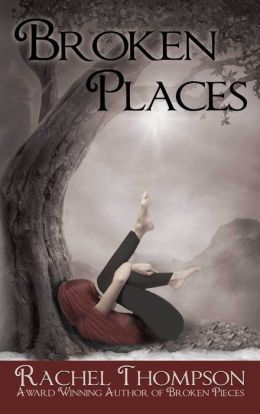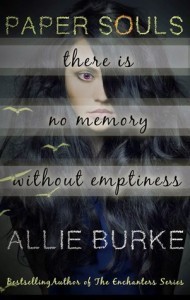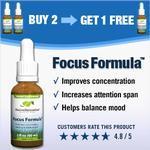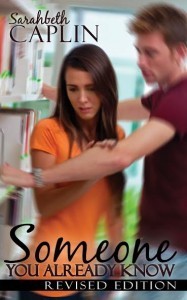Rachel Thompson's Blog, page 16
February 5, 2015
Valentine’s Day #BrokenPlaces Sweepstakes!
Valentine’s Day is fast approaching, so to celebrate I am giving away a 24 pc. Ultimate Dessert Truffles Gift Box from Godiva ($50 value) and an ebook of my latest book Broken Places (the second book in the Broken series) to one lucky winner! Enter using the form below. And please share!
and an ebook of my latest book Broken Places (the second book in the Broken series) to one lucky winner! Enter using the form below. And please share!
a Rafflecopter giveaway Award-winning author Rachel Thompson courageously confronts the topics of sexual abuse and suicide, love and healing, in her second nonfiction book of prose: Broken Places. The sequel to Rachel’s first nonfiction book, Broken Pieces, Rachel bares her soul in essays, poems and prose, addressing life’s most difficult topics with honesty. As you follow one woman’s journey through the dark and into the light, you will find yourself forever changed. Rachel’s first book in this series, Broken Pieces, has been a #1 best seller on Amazon (eBooks) on Women’s Poetry and Abuse. Please note: this book discusses serious topics, and is intended for mature audiences only.
Award-winning author Rachel Thompson courageously confronts the topics of sexual abuse and suicide, love and healing, in her second nonfiction book of prose: Broken Places. The sequel to Rachel’s first nonfiction book, Broken Pieces, Rachel bares her soul in essays, poems and prose, addressing life’s most difficult topics with honesty. As you follow one woman’s journey through the dark and into the light, you will find yourself forever changed. Rachel’s first book in this series, Broken Pieces, has been a #1 best seller on Amazon (eBooks) on Women’s Poetry and Abuse. Please note: this book discusses serious topics, and is intended for mature audiences only.
Purchase: Amazon
Photo courtesy of Public Domain Archive
Valentine’s Day #BrokenPlaces Picture Sweepstakes!
Valentine’s Day is fast approaching, so to celebrate I am giving away a 24 pc. Ultimate Dessert Truffles Gift Box from Godiva ($50 value) and an ebook of my latest book Broken Places (the second book in the Broken series) to one lucky winner!
and an ebook of my latest book Broken Places (the second book in the Broken series) to one lucky winner!
Entry is simple: just share your Broken Places inspired photo on your favorite social media channel with the hashtag #BrokenPlaces. Feel free to be creative in your interpretation of “Broken Places.” Then enter using the form below. And please share!
a Rafflecopter giveaway Award-winning author Rachel Thompson courageously confronts the topics of sexual abuse and suicide, love and healing, in her second nonfiction book of prose: Broken Places. The sequel to Rachel’s first nonfiction book, Broken Pieces, Rachel bares her soul in essays, poems and prose, addressing life’s most difficult topics with honesty. As you follow one woman’s journey through the dark and into the light, you will find yourself forever changed. Rachel’s first book in this series, Broken Pieces, has been a #1 best seller on Amazon (eBooks) on Women’s Poetry and Abuse. Please note: this book discusses serious topics, and is intended for mature audiences only.
Award-winning author Rachel Thompson courageously confronts the topics of sexual abuse and suicide, love and healing, in her second nonfiction book of prose: Broken Places. The sequel to Rachel’s first nonfiction book, Broken Pieces, Rachel bares her soul in essays, poems and prose, addressing life’s most difficult topics with honesty. As you follow one woman’s journey through the dark and into the light, you will find yourself forever changed. Rachel’s first book in this series, Broken Pieces, has been a #1 best seller on Amazon (eBooks) on Women’s Poetry and Abuse. Please note: this book discusses serious topics, and is intended for mature audiences only.
Purchase: Amazon
Photo courtesy of Public Domain Archive
January 25, 2015
5 Strategies for Parenting with a Mental Illness by @TruthisHers
Coping with a mental illness is a challenge. It’s one that 25% of Americans face every day. I am part of that statistic with diagnoses of Major Depression and Complex Post Traumatic Stress Disorder. Tackling everyday tasks like working, cooking and maintaining a home while also trying to keep my mental illness under control feels like two full time jobs. The amount of time and effort it requires to manage both of those areas of our lives is often daunting for anyone with mental illness.
When you add parenting into that mix, it can feel impossible to be successful in all three arenas. There doesn’t seem to be enough time in the day or emotional energy inside us to be a good employee, a good parent and a master of our mental illness. We struggle to make sure none of those areas gets shortchanged.
As a parent, therapist, and person with mental illness, I want to offer you five strategies you can implement today to make parenting a less stressful and more enjoyable part of your life.
Play with your children every day:
When we’re children we revel in playing. It is typically the most enjoyable part of our daily lives. When we become adults we leave all of that behind. Life becomes so serious. But play is a wonderful, healthy behavior and we need to bring it back into our lives.  Find something to do with your children that stimulates your imagination, makes you laugh, and takes you out of your head. Choose something to do that you and your children enjoy doing. The strategy backfires if playtime feels like a chore or a burden.
Find something to do with your children that stimulates your imagination, makes you laugh, and takes you out of your head. Choose something to do that you and your children enjoy doing. The strategy backfires if playtime feels like a chore or a burden.
My son and I play video games together. I never played video games as a child. And frankly, when he first got his Xbox and wanted me to play with him, I thought it would be one more chore to add to my To Do List. But he loved it and I wanted to spend time with him doing something he enjoyed. He taught me how to play a series of Mario games and it was ridiculously fun and funny. I fell into lava pits, captured stars, and mastered mini games that required me to mow my lawn faster than anyone else. We have a blast, and both of us benefit from the time we spend playing together.
Get active with your children every day:
Only 15 minutes of cardio activity causes our brain to release chemicals that increase our mood. So get up and get moving with your children every day. Again, it’s important that you do something that everyone enjoys. It can be outside shooting hoops, jumping on your trampoline or riding bicycles. Make it fun, silly and rewarding. Hand out a stick of gum to each person who makes a three point shot. Have everyone write their favorite physical activity on a piece of paper. Each week draw out a new one and that becomes the activity for the week. It doesn’t have to be more than thirty minutes a day, but it certainly can be.
On days that I’m feeling low on energy or like going out of the house is more than I can muster, my son and I fire up our Wii Sports game system. We do some dancing to Michael Jackson songs or even play virtual tennis. It might start out feeling like a chore, but once we have played for a few minutes together, I forget that I didn’t want to do it in the first place.
Reduce the number of moving parts in your lives:
When we have a mental illness our tolerance for stress and chaos is often very low . Simplicity reigns supreme! Streamline every process that you can in your daily lives. If school mornings are chaotic and stressful, implement night time routines that address that. Lay out clothes, make school lunches, and set out the food and dishes for breakfast the night before.
. Simplicity reigns supreme! Streamline every process that you can in your daily lives. If school mornings are chaotic and stressful, implement night time routines that address that. Lay out clothes, make school lunches, and set out the food and dishes for breakfast the night before.
Also, reduce the number of after school and weekend commitments you have. While it may be tempting to sign yourself and your children up for every class or activity that grabs your or their attention, too many of them will leave you feeling stressed and overwhelmed as you run from club to event. Place your priority on family activities and a peaceful, simple schedule.
Have something to look forward to each week:
We all need things to look forward to in our lives. It gives us incentive to tackle each day in front of us and motivation to keep moving when we want nothing more than to crawl back into bed for the rest of the week. Your whole family should have a special activity, that everyone enjoys, set up to do together once a week. It doesn’t have to be something expensive or elaborate. It can be as simple as a Build Your Own Ice Cream Sundae Night or a Family Movie Night.
Teach your children the value of self-care:
One of the most powerful tools anyone with mental illness can use is good self-care. These are things like meditation, visualization, self-talk, writing in a journal and therapy. We use them to manage our symptoms and prevent our illness from worsening. Those without mental illness can use self-care as well, to help reduce their stress levels and cope with anxiety and worry.
As a parent, teach your children about self-care. Let them know how important it is and help them learn a few simple self-care activities like deep breathing and taking a time out to calm down when they’re angry or upset. When you do these things you establish a common language and understanding about self-care. If you tell your children that you need a five-minute time out to let your anger go, they will understand what you mean and how doing that will help you. Making self-care a common language in your family will be helpful not just for you, but your children as well.
Sign up for my newsletter and never miss a post again! I will never share your email and that’s a promise. Follow me on Twitter @RachelintheOC or @BadRedheadMedia for social media, branding, or marketing help. Increase your blog traffic by participating in #MondayBlogs (a Twitter meme I created to share posts on Mondays — no book promo) and entering my free feature giveaway.
Broken Pieces is still going strong, #1 on Amazon’s Women’s (paid) Poetry list. Broken Places is available NOW — yay! from Booktrope.
Don’t miss Author Social Media Boot Camp! Take a look: group sessions for authors on a budget. Now you too can get affordable, effective help FAST! Follow @ASMBootCamp on Twitter and sign up today here!
All content copyrighted unless otherwise specified. © 2015 by Rachel Thompson, author. All rights reserved. Permission is granted to use short quotes provided a link back to this page and proper attribution is given to me as the original author.
Pictures courtesy of http://www.gratisography.com/
Related articles across the web
 Mental Illness in Gaming
Mental Illness in Gaming Don’t Live With It… Fix It
Don’t Live With It… Fix It Twitter – to help future generations discover if there’s ever been any mental illness in the family.
Twitter – to help future generations discover if there’s ever been any mental illness in the family. Serotonin map of brain could lead to better targeted antidepressants
Serotonin map of brain could lead to better targeted antidepressants Caregiver interventions are not enough; families with mentally ill members also need help
Caregiver interventions are not enough; families with mentally ill members also need help Facts About Mental Illness in America
Facts About Mental Illness in America
January 18, 2015
Inside Schizophrenia: ‘I Could Be AWOL Right Now’ by @allieburkebooks
Please welcome my amazing friend and talented best selling novelist, Allie Burke! Allie is quite open with the fact that she is schizophrenic (she was diagnosed with paranoid schizophrenia in 2011) works two full-time jobs, and has a thriving literary career (she just finished her eighth book). Allie is signed with Booktrope. More here:
Allie is an American novelist, book critic, and magazine editor from Burbank, California, Allie Burke writes books she can’t find in the bookstore. Having been recognized as writing a “kickass book that defies the genre it’s in”, Allie writes with a prose that has been labeled poetic and ethereal.
Her life is a beautiful disaster, flowered with the harrowing existence of inherited eccentricity, a murderous family history, a faithful literature addiction, and the intricate darkness of true love. These are the enchanting experiences that inspire Allie’s fairytales.
From some coffee shop in Los Angeles, she is working on her next novel.
Visit Allie at http://wordsbyallieburke.com and look for her outstanding latest, Paper Souls, on Amazon.
I Could Be AWOL Right Now
I think a lot about that one time I outsmarted the mental health industry and used the intellect I didn’t even know I had to break free from one white walled prison we call a hospital.
The very act of it epitomizes the ideal that we must be crazy enough to tell the whole world to fuck off if we’re ever going to survive.
Excuse me. She smiled sweetly, knocking on the station window.
A large man with a shaved head emerged, dressed in white. Yes?
I would like my purse, please.
I’m sorry?
My purse. You confiscated it when I arrived here. I would like it before I leave.
You can’t leave.
Excuse me? Emily asked incredulously, her eyes bulging out of her head. I’m sorry, am I…a prisoner? Have I committed some sort of crime and am being held against my will now?
The nurse stammered. I…I…
If I walk out that door right now, past that red line, Emily pointed to the two-inch-thick red line painted on the floor six feet from the door, are you going to chase me?
No, but if you don’t sign out, with pre-approval from Dr. Talen, then you will be considered AWOL.
Do I look like fucking Rambo to you?
The nurse didn’t answer.
I haven’t seen the doctor yet. Let me speak to him, please.
He’s not here yet.
Emily’s stare at the nurse was intense, but in reality, she wasn’t staring at him but the stupidity his body reeked of.
Call him. Now.
-Paper Souls
I didn’t ask him for my purse, even though I wanted to. I had never been as appalled as I had been in the moment six hours earlier when they had confiscated my cell phone. Though I was thinking all of this, and it would actually make for a really good story, I never referenced Rambo. My mental age was so much younger than it is now; I was so scared. I would have welcomed a thousand years of psychosis in that moment and took it like a boss if it meant I could walk out that door unscathed by the disgusting reality that is our mental health system today.
What I had done, though, was spend six hours in a mental institution without any means to communicate anything to the outside world and without actually seeing a doctor.
The presence of my now ex-husband in that tiny visiting room with another nurse watching our every move, his tears, the fear bleeding from his pores, struck something in me. He wasn’t working and I was the only one paying bills. Clearly I hadn’t thought this through the moment suicide crossed my mind and convinced me that I wasn’t getting any better. My life would be in shambles if I didn’t get my ass out of there and get it to work on Monday morning. If I had a second chance at that afternoon, I would not have checked myself into a fucking mental institution . I would not have told them that I was hallucinating and afraid of harming myself and that I was off my medication.
. I would not have told them that I was hallucinating and afraid of harming myself and that I was off my medication.
So I told them that. That was after they nearly had me sedated and straitjacketed for stepping too far into their nursebox. But I did tell them the truth. I told them that this place was going to do nothing for me but ruin my life, and I needed out. They told me that I should stay because they could help me. That they would recommend it. It was such a passive-aggressive fucking way to control my life. You are mentally ill and therefore we cannot trust you to function properly in society, but here, have a cookie.
They told me that I should stay because they could help me. That they would recommend it. It was such a passive-aggressive fucking way to control my life. You are mentally ill and therefore we cannot trust you to function properly in society, but here, have a cookie.
There really was a red line on the floor. That wasn’t something I made up for the book. I’ve never liked the color red, and maybe this is why. The ideal that a color can instill the fear of imprisonment is pretty psychotic in itself, but I am psychotic. Technically. According to the State of California.
So I asked them. Are you going to arrest me if I just walk out?
I still don’t know what they meant by AWOL. Like is that a real thing? What does it mean if you are AWOL and not in the military? Do they take away your driver’s license? Refuse to hire you at a job? Call the credit reporting agency? I can’t even with this shit.
Either I am really smart or the doctor was in a good mood that day. He just got a blow job by his assistant, I don’t know. They let me go. Like, legally. Without the AWOL part. It was really fucking weird, but every day I thank whatever higher power we are thanking for this kind of stuff now. Regardless of the number of times I did go back, I really do believe that that experience of questioning authority as the prisoner and not the jailer set the tone for the healing process that I would force on myself in the years after. It was my fuck off to the people bigger than me. And I’ve been telling people bigger than me to fuck off ever since.
It works for me. Me specifically. Paranoid Schizophrenic or not, I’m still a real person.
“The only difference between the sane and the insane is the sane have the power to lock up the insane.”
–Hunter S. Thompson
Exciting news: Broken Places is FINALLY out (via Booktrope)! Pick up a copy today (eBook or print) on Amazon or your favorite retailer, Broken Pieces is still going strong, and my two humor books, A Walk in the Snark and Mancode: Exposed have wonderful new covers and are now available in print!
Sign up for my newsletter and never miss a post again! I will never share your email and that’s a promise. Follow me on Twitter @RachelintheOC or @BadRedheadMedia for social media, branding, or marketing help. Increase your blog traffic by participating in #MondayBlogs (a Twitter meme I created to share posts on Mondays — no book promo) and entering my free feature giveaway.
Don’t miss Author Social Media Boot Camp! Take a look: group sessions for authors on a budget. Now you too can get affordable, effective help FAST! Follow @ASMBootCamp on Twitter and sign up today here!
All content copyrighted unless otherwise specified. © 2015 by Rachel Thompson, author. All rights reserved. Permission is granted to use short quotes provided a link back to this page and proper attribution is given to me as the original author.
Picture courtesy of Pixabay via CCA Public Domain license
Related articles across the web
 High IQ could be shield against schizophrenia, scientists say
High IQ could be shield against schizophrenia, scientists say Onset of Schizophrenia Linked to Elevated Neural Links
Onset of Schizophrenia Linked to Elevated Neural Links Is schizophrenia one disease… or eight?
Is schizophrenia one disease… or eight? Schizophrenia Less Likely in People With High IQ
Schizophrenia Less Likely in People With High IQ Enter The Mind Of A Schizophrenic With Art Made By PeopleWith The Disease
Enter The Mind Of A Schizophrenic With Art Made By PeopleWith The Disease CHILD ABUSE~Inform, Educate, Empower
CHILD ABUSE~Inform, Educate, Empower Freud, More Harm Than Good
Freud, More Harm Than Good Rosie O’Donnell Slams Stephen Collins, Accuses Katie Couric of Going Easy on Him
Rosie O’Donnell Slams Stephen Collins, Accuses Katie Couric of Going Easy on Him Early Childhood Brain Development & Communication. Trauma
Early Childhood Brain Development & Communication. Trauma Abuse in Childhood Tied to Migraines in Adulthood
Abuse in Childhood Tied to Migraines in Adulthood
January 11, 2015
Speaking Up About Rape: Brave or Foolish? by Guest @SbethCaplin
 Please welcome author and blogger Beth Caplin to the blog today as she shares her brave story about speaking up.
Please welcome author and blogger Beth Caplin to the blog today as she shares her brave story about speaking up.
*Trigger Warning*
The lyrics to “Brave” by Sara Bareilles hit me hard and personally:
Your history of silence won’t do you any good/Did you think it would?/Let your words be anything but empty/Why don’t you tell them the truth?
That’s exactly what I’m ready to do.
Tell the truth.
But first, here’s the back story:
THE BACK STORY
When I was seventeen, the summer before my senior year of high school, I met an outgoing, attractive, and charismatic twenty-one-year-old man about to enter his senior year of college. It was the kind of relationship where I dove in headfirst, as only a headstrong teenager can.
Fast forward two years, when I am nineteen and visiting him at his college over spring break. We’d been having the “Should we or shouldn’t we?” talk about sex for some time, but ultimately it was decided that we couldn’t go all the way, as that would be a violation of both our religious beliefs. But somehow, for him, that conviction did not rule out everything we could do before that final step. When I refused to even go that far, he raped me (I’ll spare you the details).
I didn’t know it was rape at the time . For years afterward, I became easily preyed upon by the words “You know you want it,” “I thought you loved me,” “You owe me this,” and similar sentiments. It didn’t take long for force to become unnecessary: I was damaged goods, and this relationship was as good as I could hope to get.
. For years afterward, I became easily preyed upon by the words “You know you want it,” “I thought you loved me,” “You owe me this,” and similar sentiments. It didn’t take long for force to become unnecessary: I was damaged goods, and this relationship was as good as I could hope to get.
PRESENT DAY
Fast forward another seven years to present day, when I am married to the love of my life: a man who treats me better than I ever thought I deserved. It truly stunned me that he respected my concerns about boundaries, when that should be a normal expectation of any healthy relationship. In many ways, his kindness continues to surprise me.
Clearly, this is not okay. Only now, seven years later, am I considering the ramifications of speaking up, because fear held me captive for so long. Problem is, the option of speaking up in a court of law has long passed due to the statute of limitations (not to mention a complete lack of physical evidence).
What choices am I left with? If I can’t have a lawyer speak on my behalf, I’ll have to use my own voice. And instead of a jury, my audience will have to be the people who know me personally. People who know us both.
And yet I hesitate. For many people, contacting their abusers or raising any kind of hell could have serious ramifications on their safety. Now that we are several states away, my physical safety is not a concern. Instead, there is my public image to think about. I think it’s extremely admirable to not care what others think, but as an aspiring writer with a growing audience, I cannot afford to completely embrace that mindset. I am building a reputation, and few words that are projected into the cyber world can ever be taken back.
TO TELL OR NOT TO TELL?
In my most lucid moments, I tell myself this is about justice. Who cares about the consequences, if telling people is the right thing to do? This concerns the safety of all the women in his life. But there is a part of me that desires vengeance, and it’s unclear how much of that desire is righteous or vindictive. I cannot deny that, as a human who has been deeply hurt, part of me desires to witness a public humiliation, a virtual flogging, if you will.
Sorting through these conflicting feelings also requires evaluating the person I want to be. In the novels that shaped me growing up, the heroines who faced adversity always took the high road. Even Jesus, the center of my religious faith, advocated turning the other cheek. I want to be remembered as someone noble, righteous, and compassionate. At what point does my pursuit of justice conflict with that sort of character?
 Perhaps you or someone you know has been in a similar situation. I was fortunate to move away from the place where the abuse occurred, but some people have to see their assailants on a regular basis; perhaps because they share custody of children, work together, or are related. There are so many complicated factors that influence the way justice will be enacted, if it is to be enacted at all.
Perhaps you or someone you know has been in a similar situation. I was fortunate to move away from the place where the abuse occurred, but some people have to see their assailants on a regular basis; perhaps because they share custody of children, work together, or are related. There are so many complicated factors that influence the way justice will be enacted, if it is to be enacted at all.
So long as one’s pursuit of justice does not involve harmful behaviors – stalking, further violence, harassment – perhaps there are no right or wrong answers. Ultimately, the question of self-care should be the most important. Ask yourself, and be willing to be honest: How will this affect me? What are the potential consequences? Am I willing to sacrifice a few relationships in the process? How critical is justice to my journey of healing, and am I willing to accept that not even justice will erase the damage that has already been done?
Regardless of whether justice is served, I won’t let that stop me from moving forward and reclaiming my life. At the same time, I am left wondering if speaking up about what happened to me is brave or foolish.
 Beth Caplin is a Denver-based author and blogger. Her first novel,
Someone You Already Know
, follows two teenage girls on their journey to heal from rape culture. Find her on her website, sbethcaplin.com, or engage on Twitter @SbethCaplin
Beth Caplin is a Denver-based author and blogger. Her first novel,
Someone You Already Know
, follows two teenage girls on their journey to heal from rape culture. Find her on her website, sbethcaplin.com, or engage on Twitter @SbethCaplin
 Two teenage girls, two experiences with sexual assault: one committed by a stranger, the other by a relationship partner. Neither girl quite believes the other when she shares her story: wasn’t she ‘asking for it’ by walking home alone so late at night? Why didn’t she just end the relationship if he really treated her that way?
Two teenage girls, two experiences with sexual assault: one committed by a stranger, the other by a relationship partner. Neither girl quite believes the other when she shares her story: wasn’t she ‘asking for it’ by walking home alone so late at night? Why didn’t she just end the relationship if he really treated her that way?
Someone You Already Know is a raw, emotional book that explores the impact of rape culture on modern society. Told in alternating perspectives from two survivors, it unpacks the common myths of sexual assault, revealing important truths that every woman needs to know.
Sign up for my newsletter and never miss a post again! I will never share your email and that’s a promise. Follow me on Twitter @RachelintheOC or @BadRedheadMedia for social media, branding, or marketing help. Increase your blog traffic by participating in #MondayBlogs (a Twitter meme I created to share posts on Mondays — no book promo) and entering my free feature giveaway.
Broken Pieces is still going strong, #1 on Amazon’s Women’s (paid) Poetry list. Broken Places will be out after New Year’s from Booktrope.
Don’t miss Author Social Media Boot Camp! Take a look: group sessions for authors on a budget. Now you too can get affordable, effective help FAST! Follow @ASMBootCamp on Twitter and sign up today here!
All content copyrighted unless otherwise specified. © 2015 by Rachel Thompson, author. All rights reserved. Permission is granted to use short quotes provided a link back to this page and proper attribution is given to me as the original author.
Photo courtesy of Unsplash.com
Related articles across the web
 What motivates males who commit sexual assault on campus?
What motivates males who commit sexual assault on campus? What We Talk About When We Talk About Bill Cosby
What We Talk About When We Talk About Bill Cosby PS22 Chorus Sing ‘Brave’ In Front Of Sara Bareilles – Watch Now!
PS22 Chorus Sing ‘Brave’ In Front Of Sara Bareilles – Watch Now!
Speaking Up: Is it brave or is it foolish by guest @SbethCaplin
Please welcome author and blogger Beth Caplin to the blog today as she shares her story about speaking up. *Trigger Warning*
The lyrics to “Brave” by Sara Bareilles hit me hard and personally:
Your history of silence won’t do you any good/Did you think it would?/Let your words be anything but empty/Why don’t you tell them the truth?
That’s exactly what I’m ready to do.
Tell the truth.
But first, here’s the backstory:
When I was seventeen, the summer before my senior year of high school, I met an outgoing, attractive, and charismatic twenty-one-year-old man about to enter his senior year of college. It was the kind of relationship where I dove in headfirst, as only a headstrong teenager can.
Fast forward two years, when I am nineteen and visiting him at his college over spring break. We’d been having the “Should we or shouldn’t we?” talk about sex for some time, but ultimately it was decided that we couldn’t go all the way, as that would be a violation of both our religious beliefs. But somehow, for him, that conviction did not rule out everything we could do before that final step. When I refused to even go that far, he raped me (I’ll spare you the details of how).
I didn’t know it was rape at the time. For years afterward, I became easily preyed upon by the words “You know you want it,” “I thought you loved me,” “You owe me this,” and similar sentiments. It didn’t take long for force to become unnecessary: I was damaged goods, and this relationship was as good as I could hope to get.
Fast forward another seven years to present day, when I am married to the love of my life: a man who treats me better than I ever thought I deserved. It truly stunned me that he respected my concerns about boundaries, when that should be a normal expectation of any healthy relationship. In many ways, his kindness continues to surprise me.
Clearly, this is not okay. Only now, seven years later, am I considering the ramifications of speaking up, because fear held me captive for so long. Problem is, the option of speaking up in a court of law has long passed due to the statute of limitations (not to mention a complete lack of physical evidence).
What choices am I left with? If I can’t have a lawyer speak on my behalf, I’ll have to use my own voice. And instead of a jury, my audience will have to be the people who know me personally. People who know us both.
And yet I hesitate. For many people, contacting their abusers or raising any kind of hell could have serious ramifications on their safety. Now that we are several states away, my physical safety is not a concern. Instead, there is my public image to think about. I think it’s extremely admirable to not care what others think, but as an aspiring writer with a growing audience, I cannot afford to completely embrace that mindset. I am building a reputation, and few words that are projected into the cyber world can ever be taken back.
In my most lucid moments, I tell myself this is about justice. Who cares about the consequences, if telling people is the right thing to do? This concerns the safety of all the women in his life. But there is a part of me that desires vengeance, and it’s unclear how much of that desire is righteous or vindictive. I cannot deny that, as a human who has been deeply hurt, part of me desires to witness a public humiliation: a virtual flogging.
Sorting through these conflicting feelings also requires evaluating the person I want to be. In the novels that shaped me growing up, the heroines who faced adversity always took the high road. Even Jesus, the center of my religious faith, advocated turning the other cheek. I want to be remembered as someone noble, righteous, and compassionate. At what point does my pursuit of justice conflict with that sort of character?
Perhaps you or someone you know has been in a similar situation. I was fortunate to move away from the place where the abuse occurred, but some people have to see their assailants on a regular basis; perhaps because they share custody of children, work together, or are related. There are so many complicated factors that influence the way justice will be enacted, if it is to be enacted at all.
So long as one’s pursuit of justice does not involve harmful behaviors – stalking, further violence, harassment – perhaps there are no right or wrong answers. Ultimately, the question of self-care should be the most important. Ask yourself, and be willing to be honest: How will this affect me? What are the potential consequences? Am I willing to sacrifice a few relationships in the process? How critical is justice to my journey of healing, and am I willing to accept that not even justice will erase the damage that has already been done?
Regardless of whether justice is served, I won’t let that stop me from moving forward and reclaiming my life. At the same time, I am left wondering if speaking up about what happened to me is brave or foolish.
 Beth Caplin is a Denver-based author and blogger. Her first novel, Someone You Already Know, follows two teenage girls on their journey to heal from rape culture. Find her on her website, sbethcaplin.com, or engage on Twitter @SbethCaplin
Beth Caplin is a Denver-based author and blogger. Her first novel, Someone You Already Know, follows two teenage girls on their journey to heal from rape culture. Find her on her website, sbethcaplin.com, or engage on Twitter @SbethCaplin Two teenage girls, two experiences with sexual assault: one committed by a stranger, the other by a relationship partner. Neither girl quite believes the other when she shares her story: wasn’t she ‘asking for it’ by walking home alone so late at night? Why didn’t she just end the relationship if he really treated her that way?
Two teenage girls, two experiences with sexual assault: one committed by a stranger, the other by a relationship partner. Neither girl quite believes the other when she shares her story: wasn’t she ‘asking for it’ by walking home alone so late at night? Why didn’t she just end the relationship if he really treated her that way?
Someone You Already Know is a raw, emotional book that explores the impact of rape culture on modern society. Told in alternating perspectives from two survivors, it unpacks the common myths of sexual assault, revealing important truths that every woman needs to know.
Sign up for my newsletter and never miss a post again! I will never share your email and that’s a promise. Follow me on Twitter @RachelintheOC or @BadRedheadMedia for social media, branding, or marketing help. Increase your blog traffic by participating in #MondayBlogs (a Twitter meme I created to share posts on Mondays — no book promo) and entering my free feature giveaway.
Broken Pieces is still going strong, #1 on Amazon’s Women’s (paid) Poetry list. Broken Places will be out after New Year’s from Booktrope.
Don’t miss Author Social Media Boot Camp! Take a look: group sessions for authors on a budget. Now you too can get affordable, effective help FAST! Follow @ASMBootCamp on Twitter and sign up today here!
All content copyrighted unless otherwise specified. © 2015 by Rachel Thompson, author. All rights reserved. Permission is granted to use short quotes provided a link back to this page and proper attribution is given to me as the original author.
Photo courtesy of stockimages at FreeDigitalPhotos.net
Related articles across the web
 What motivates males who commit sexual assault on campus?
What motivates males who commit sexual assault on campus? What We Talk About When We Talk About Bill Cosby
What We Talk About When We Talk About Bill Cosby PS22 Chorus Sing ‘Brave’ In Front Of Sara Bareilles – Watch Now!
PS22 Chorus Sing ‘Brave’ In Front Of Sara Bareilles – Watch Now!
January 7, 2015
#MondayBlogs Giveaway January 2015
Since I created #MondayBlogs in late 2012, even I’m shocked at what an amazing success it has become! Thousands participate each week, generating more than 5,000 tweets! And it is because of all of you that we can say that with a lot of pride and a big ol’ smile! As a thank you to all you wonderful #MondayBlogs tweeps, we launched an ongoing, monthly giveaway contest in April and we couldn’t be happier with the response!
The Featured Monday Blogger giveaway is our way to say thank you for participating in #MondayBlogs by giving you more exposure for you and your blog. Each Monday for one month, you could have a different tweet sent out by @MondayBlogs to all our followers and be featured on IndieBookPromo.com! But wait, there’s more! Following you, the lucky winner, on Twitter would enter others into the next month’s contest!
Who doesn’t want more blog traffic and a free feature? #MondayBlogs
Nice bit of exposure, don’t ya think?
That sound like something you’d be interested in?
If so, enter now!
Featured Blogger December 2014
Leetah Begallie
Happy Sharing,
Rachel, Will, and Kate
Please note that due to the popularity of Indie Book Promo guest posts will be scheduled according to availability. If you cannot wait for your post to be up you may decline the prize.
Sign up for my newsletter and never miss a post again! I will never share your email and that’s a promise. Follow me on Twitter @RachelintheOC or @BadRedheadMedia for social media, branding, or marketing help. Increase your blog traffic by participating in #MondayBlogs (a Twitter meme I created to share posts on Mondays — no book promo) and entering my free feature giveaway.
Don’t miss Author Social Media Boot Camp! Take a look: group sessions for authors on a budget. Now you too can get affordable, effective help FAST! Follow @ASMBootCamp on Twitter and sign up today!
January 4, 2015
10 Resources for Finding a Therapist by @TruthisHers
You’ve decided you or a loved one need counseling. As both a therapist and a mental health consumer, I have been on both sides of the counseling desk. Hiring a therapist is intensely personal. This is someone you are going to tell your deepest hopes and fears. For the therapeutic process to work the client must both trust and respect their mental health provider. Without those two components everyone is wasting their time.
The best counselor for me, or anyone, is someone who has both the skills and the personality that match my needs. Finding the best combination for you feels both overwhelming and intimidating. But knowing a good selection of resources to find that therapist will make the process smoother and easier.
Word of Mouth – Sometimes nothing is better than a word of mouth recommendation. To the extent that you are comfortable, ask people you know for referrals. Don’t forget to ask if anyone they know is a therapist, too.
Crowd Sourcing – This is the word of mouth of the internet. To the extent that you are comfortable, use social media networks where you are active to seek recommendations. It’s perfectly acceptable to fib just a bit, for example: “A family member needs a therapist in Dallas who can help with depression. Does anyone know a good one?”
Your Insurance Company – Your insurance company likely has a list of “in network” therapists they work with. Sometimes the list is online and can be accessed via their home page. If it isn’t there try calling your insurance company.
Online Databases – My favorite website to research therapists is PsychologyToday.
 Not only is their database extensive, but it’s searchable by multiple criteria like the therapist’s location and their specialties. Good Therapy and Theravive also provide good online databases.
Not only is their database extensive, but it’s searchable by multiple criteria like the therapist’s location and their specialties. Good Therapy and Theravive also provide good online databases.A Google search – Sometimes nothing replaces a good old Google search. Plug in the word “therapist” along with the geographic area you’d prefer and up pops a list of therapists and websites. Although they have been a bit slow to migrate to the internet, many therapists now have their own websites.
Online and In Real Life Support Groups – Do you attend Al-Anon meetings or belong to a local Divorce Recovery group? Have you joined a Facebook support group for those with depression? All of these groups are a rich resource for locating a therapist.
Professional Organizations – Professional organizations for therapists will often have a list of organization members on their websites that the public can access. A good collection of sites to access are The American Association of Marriage and Family Therapists, The American Psychological Association and The American Counseling Association.
Your Physician – Family doctors, internists and general practitioners are often the first line of treatment for mental health problems. Ask your physician if they have a list of therapists that they typically provide to their patients.
Your Clergyperson – Clergy are another set of professionals that usually have a list of mental health providers that they give to their members. If one of your needs is working with a therapist who is supportive of your spiritual beliefs then your minister is a helpful resource to tap.
Local Universities – Universities that offer graduate degrees in counseling, therapy or psychology often have a mental health clinic where their students can put into practice the skills they are learning. This is an excellent resource for those seeking low cost or free services. Even though the therapists have not received their degrees yet, they are closely supervised by an expert with all of the proper credentials.
 Once you find a few prospective names don’t be afraid to call their office and ask to speak with them before you book an appointment. Most good therapists will provide a complimentary five or ten minute call to address your questions. If, after talking to someone, you feel comfortable with them then do book an appointment. Seeking counseling is a brave step
Once you find a few prospective names don’t be afraid to call their office and ask to speak with them before you book an appointment. Most good therapists will provide a complimentary five or ten minute call to address your questions. If, after talking to someone, you feel comfortable with them then do book an appointment. Seeking counseling is a brave step . When you find someone with whom you can build a rapport and trust, not only will you resolve problems you’ve been experiencing but you will develop new skills that can move you forward into the life you dream about living.
. When you find someone with whom you can build a rapport and trust, not only will you resolve problems you’ve been experiencing but you will develop new skills that can move you forward into the life you dream about living.
Sign up for my newsletter and never miss a post again! I will never share your email and that’s a promise. Follow me on Twitter @RachelintheOC or @BadRedheadMedia for social media, branding, or marketing help. Increase your blog traffic by participating in #MondayBlogs (a Twitter meme I created to share posts on Mondays — no book promo) and entering my free feature giveaway.
Broken Pieces is still going strong, #1 on Amazon’s Women’s (paid) Poetry list. Broken Places will be out after New Year’s from Booktrope.
Don’t miss Author Social Media Boot Camp! Take a look: group sessions for authors on a budget. Now you too can get affordable, effective help FAST! Follow @ASMBootCamp on Twitter and sign up today here!
All content copyrighted unless otherwise specified. © 2015 by Rachel Thompson, author. All rights reserved. Permission is granted to use short quotes provided a link back to this page and proper attribution is given to me as the original author.
December 28, 2014
Top 3 Writing and Marketing Tips For Any Author
As we head into 2015, I thought I’d share some thoughts on writing and marketing books. Many authors tell me they just don’t have time to do both, that they think marketing is stupid, or that social media and author platform seem like options they’re not convinced are worth learning about or spending time on.
I’m not here to convince anyone otherwise, though I find those questions ludicrous because being an author is no different than being a small business.  Think of it this way: if you opened a restaurant and did no advertising — told nobody about it, did no social media, ran zero ads, didn’t even put up a sign — would you be in business for very long? No way. So how is releasing a book any different?
Think of it this way: if you opened a restaurant and did no advertising — told nobody about it, did no social media, ran zero ads, didn’t even put up a sign — would you be in business for very long? No way. So how is releasing a book any different?
Let’s deconstruct.
MAKE TIME FOR BOTH — here’s how
It is difficult to find time to write and market. I totally understand that. As a busy working mother of two demanding kids, I empathize completely. I not only have (almost) four books out, I’m also under contract now with Booktrope to write more. I also own BadRedhead Media, helping authors and small businesses with social media, branding, and marketing. Fitting in time to write and market my own work is challenging, to say the least.
But not impossible. I use social media management tools like Hootsuite and ManageFlitter (some people prefer Buffer or Pluggio) to schedule and grow my accounts. They cost money, but not exorbitant amounts. What they cost in money I more than make up in time spent on other things.
I schedule in some content (mostly articles or blog posts) across my various social media channels, and live interact when I can. I grow my account every few days using targeted keywords, unfollow people who don’t follow back (I give people thirty days — that’s plenty of time), and block fakes. It’s easy and effective.
Scheduling allows me to work on my next books, as well as work on client accounts, and be a mom or do laundry or you know, burn a meal. We all have real lives to lead — there are plenty of tools out there to make it work. You have to spend a little bit of time to set them up, and time to find and schedule in content, but it takes only minutes. Surely, you have minutes.
SOCIAL MEDIA/MARKETING IS STUPID — not
Get with the program, folks. Marketing has been around forever, and social media has made it easier than ever to connect with readers. Even without marketing experience, you too can learn without paying a dime by doing what writers do best: research. Google stuff, read my biz blog, check out BookPromotion.com for great suggestions and tips, or look at top blogs like CopyBlogger or Social Media Examiner to find tidbits. Is there a writer you like? See what they do to market their work and copy their methods.
Regardless of whether you think Twitter is for your teen girl or what you ate for lunch (please, that’s so 2005), your readers don’t think that. They are there, interacting with thousands of writers daily. You are missing out on opportunities!
Check this: Some 73% of online adults now use a social networking site of some kind (Source: Pew Research, December, 2013). Facebook is still the dominant social network of choice, but Twitter, Instagram and Pinterest have risen in popularity within many demographics, particularly women. Keep on thinking it’s stupid. The rest of us will be over there developing relationships with readers.
AUTHOR PLATFORM — what it is and what it’s not
What is an author platform anyway? Many writers are so confused by this seemingly nebulous concept that they cower in fear at the very mention, or make derisive comments to hide their ignorance. I get it. When I started in 2009, I had no clue what a platform was. My background was in selling, advertising, and marketing Big Pharma, not books! But instead of making fun of it, I researched, asked questions, and learned.
I really like Jane Friedman’s definition of author platform, because it has four key components of what a platform is and also what it’s not. What a platform contains:
Visibility
Authority
Proven Reach
Target Audience
What it’s not:
It is not about self-promotion.
It is not about hard selling.
It is not about annoying people.
It is not about being an extrovert.
‘Platform is not about bringing attention to yourself, or by screaming to everyone you can find online or offline, “Look at me! Look at me!” Platform isn’t about who yells the loudest or who markets the best.’
Here’s a simple breakdown of what any author needs for their platform:
an optimized website
a blog with fresh content (minimum once weekly)
social media accounts (Twitter, Facebook, Facebook page, Google+, Goodreads, and either Instagram or Pinterest)
reviews when your book is released
a newsletter
advertising
most important of all: a spectacular, professionally edited, designed, and formatted, book!
You can’t create your platform overnight, and it’s not a race. If you don’t know how to do all these things (I didn’t. Most people don’t.), hire people to help you, or trade services with pros. If you can’t afford it, don’t just throw up your hands and say, “I can’t afford it, so I’ll just copy and past my book into a Word doc, upload it, and see what happens,” because that’s not a book; that’s a school project. That’s what gives self-published authors a bad name.
Raise the funds. Go to Pubslush.com, start a crowdfunding campaign (anything you raise, you keep except their small cut), even if you don’t fulfill your goal.
FINAL WORDS
Social media will not sell books. Get off the “Buy my book!” link dump if that’s how you use it. Instead, spend time interacting with people. Why? Because social media leads to relationships with readers, which then leads to selling books. And start early, at least three to six months before you release your book. Develop relationships with readers as well as book bloggers and reviewers. Create electricity, some buzz, so when you do release it people are interested.
And start early, at least three to six months before you release your book. Develop relationships with readers as well as book bloggers and reviewers. Create electricity, some buzz, so when you do release it people are interested.
This is why you have to write and market. Remember, change your expectations: it’s not about one-way broadcasting or link-dumping. That’s lazy and ineffective. Think like a businessperson, set goals, and be smart.
Sign up for my newsletter and never miss a post again! I will never share your email and that’s a promise. Follow me on Twitter @RachelintheOC or @BadRedheadMedia for social media, branding, or marketing help. Increase your blog traffic by participating in #MondayBlogs (a Twitter meme I created to share posts on Mondays — no book promo) and entering my free feature giveaway.
Broken Pieces is still going strong, #1 on Amazon’s Women’s (paid) Poetry list. Pick up a copy today, on sale for just 99cents, or one for a friend. Broken Places will be out after New Year’s from Booktrope.
Don’t miss Author Social Media Boot Camp! Take a look: group sessions for authors on a budget. Now you too can get affordable, effective help FAST! Follow @ASMBootCamp on Twitter and sign up today here!
All content copyrighted unless otherwise specified. © 2014 by Rachel Thompson, author. All rights reserved. Permission is granted to use short quotes provided a link back to this page and proper attribution is given to me as the original author.
Photos courtesy of Unsplash.com
December 21, 2014
Insider Story: Living with Complex #PTSD by guest @A_K_Taylor
Hi everyone, I am glad to be here even though I am going to be talking about very dreadful subjects. I felt empowered to share some info about Complex PTSD (CPTSD) and Continuous Traumatic Stress Disorder (CTSD).
CTSD and CPTSD are very closely related to each other and they can evolve between one another like the swinging of a pendulum–this is something I know because I have experienced it first-hand. To keep things simple, both are repeated exposures to trauma over time. They are considerably more harmful and detrimental to a person than PTSD (not that I am trivializing it at all). It’s basically developing PTSD over and over again. The more it happens, the worse things become.
Of course, any source of trauma that one suffers repeatedly can lead to CTSD/CPTSD.
My source of trauma was long term bullying of over 20 of my 34 years I have been alive. I have a couple instances that are unrelated to bullying that also developed PTSD: a natural disaster (tornado) and a very bad visit to a gynecologist.
The Dirty Laundry List of Symptoms
In addition to the related symptoms that CPTSD has with PTSD, it also has:
interpersonal and social problems, emotional deregulation, loss of faith, inability to experience joy or happiness, increased hostility and anger management issues, highly volatile explosive anger and rage, increased despair, more extreme isolation, apathy, avoidance, feelings of vengeance, the need for a cause to help others not experience the trauma, need of a rescuer, and attachment issues (especially insecure attachment).
In some scenarios, a person can feel persecuted, unwanted, hated, despised, and that they are different from other human beings (“Why me?”).
Sense of self, self image, and self esteem is down the toilet. There is even further anxiety problems including what is called anticipatory anxiety where a person “anticipates” or expects trauma. To make things even worse, a person with CPTSD becomes desensitized or numb to trauma without realizing it. In addition to the emotional, mental, and psychological issues, a lot of physiological issues can develop from these: migraines, chronic fatigue, PMDD (women only), joint and muscle pain, issues with weight, burn-out, insomnia, and hypersomnia.
To complete the set, a learned helplessness develops. People with CPTSD are very prone to re-victimization.
When CTSD comes out to play, the entire laundry list of PTSD and CPTSD swells to the extreme and becomes hard-wired. It can also cause:
loss of faith in the good of humanity and the world, loss of sense of safety and security, extreme fears of conspiracy, the near or complete inability to trust, and even more extreme social and interpersonal anxiety and fear.
To make this even worse, trauma seems to become the norm to the sufferer (this is my lot in life; it’s never going to get better or change).
CPTSD that has evolved from CTSD is even more damaging. As I mentioned before, things can easily swing the other way, so there is an extreme risk of relapse or re-victimization {Ed. note: this is a legal term, as definite by the criminal justice system}.
For further reading you can put these terms into your search engine of choice: Continuous Traumatic Stress Disorder, Complex PTSD. There are tons of great material to be found!
A Life of Dark and Gray
Bullying, betrayal, and being ostracized became commonplace for me , and after a time, I felt like the rest of my life was going to be this way, slugging it out in a dog-eat-dog world for even a meager existence.
, and after a time, I felt like the rest of my life was going to be this way, slugging it out in a dog-eat-dog world for even a meager existence.
I wondered why everybody hated me so much or what it was about me that they found so offensive. Just existing and breathing the air seemed to be enough. I couldn’t be myself without suffering consequences. I had to hide who I was and guard it well. People just waited to knife me in the back, if they had the chance. I walked through life with a target on my back. Just saying hello would end in imminent attack and ridicule.
Why could some people be themselves without consequences? Why was just one true friend forever in the world too much to ask?
At times, I felt like I was an alien. Was there something wrong with me? Why were people so mean and cruel to me? Why was everyone against me? I got to where I didn’t want to come to school anymore and wanted to do my learning at home. It’s not like anyone would have noticed if I never came back. Actually, they would probably throw a party.
There were times I would reach total breakdown . I had unimaginable pain on the inside that would ache worse than a broken bone. I felt crushed by a torrent of loneliness, but I was reminded that I was unwanted and unloved by everyone outside of my family, and there was nothing I could do. I became so angry and volatile, but I didn’t know why. Sometimes, I felt about as stable as nitroglycerine, just ready to go off without warning. I indiscriminately hated and resented everyone, the entire world, because they hated me for no reason. I didn’t know why I didn’t seem to belong among the human race.
. I had unimaginable pain on the inside that would ache worse than a broken bone. I felt crushed by a torrent of loneliness, but I was reminded that I was unwanted and unloved by everyone outside of my family, and there was nothing I could do. I became so angry and volatile, but I didn’t know why. Sometimes, I felt about as stable as nitroglycerine, just ready to go off without warning. I indiscriminately hated and resented everyone, the entire world, because they hated me for no reason. I didn’t know why I didn’t seem to belong among the human race.
The waterworks would turn on by themselves no matter how hard I fought them, and I would weep in the middle of the woods. Nobody should see me like this, so I better get over it fast. If I played the part of a baby at school, the bullies would tear me apart.
There were times I seemed so numb I didn’t feel anything at all. I wasn’t happy, or was I sad? I was tightly closed off from the world like a box turtle. Since it happened almost all the time, I expected disaster, failure, or attack. Everything I would ever do or not do was going to be hard since the world is against me. I tried to excel in tasks and gain merit, but when popularity was involved, I was out of the race. Then I just wouldn’t bother.
Then it was just about surviving–clawing my way through. For what? Why? This is what my life is going to be like until I die? My life seemed to lose meaning. I began to lose sight of who I was, what my purpose was, or if I even had one. Purpose, as well as my hopes and dreams, seemed impossible. Finding friends or even someone to love is far too risky and dangerous to me since I felt so fragile that I would shatter at any moment, and my world would implode.
So then I became afraid to believe in anything. I was afraid to trust anyone. I was afraid to get too happy about anything. I got tired of being let down or being thrown to the wolves or left to drown. There is only so much disappointment I can take. After a short amount of time, I would be quickly reminded of why this was so, and I would scold myself for opening myself up to it again. When would I just stop?
I had a hunger deep inside of me that wouldn’t go away. Isolation and withdrawal just made it hurt even more. If I had a positive interaction with a person, I was reminded of it more, and it seemed to be what I longed for. It just didn’t come often enough. Everything would be like it was tomorrow, and it may be another long while before someone would be nice to me again.
Once in a while, I would attend a social gathering, but it seemed as if I was on high alert the whole time. I wouldn’t approach anyone; I waited until they approached me–apprehensively. Afterwards, I would go home and sleep for two hours since I was so exhausted. I didn’t really know why. Before the gathering, I would be excited but stressed out at the same time, even for a week before. Sometimes, I contemplated on chickening out, but then it may be a year before I was invited to another.
Survival and Recovery
During the years, I never really had a normal life and it was a struggle to make it through the day before I had to do it again tomorrow. As a child, I created imaginary friends, had animal friends, connected with my Creator, and created elaborate fantasy worlds where I had many, many adventures. The only problem with my animal friends was that they didn’t live forever, and when they died, I lost my best friend. That was hard. I had to leave almost everything I had at home before I went to face the world that waited to pummel me.
When I became a teenager, I had to find different ways to enter into my fantasy worlds. I was at the age where I couldn’t play anymore, but I tried to stick it out as long as possible.
Then, I discovered writing.
I would write myself back in to my realms and discovered new ones. I taught myself how to write novels, and flourished. I never intended to publish, but that’s another story. I also shared this with a younger cousin and we had some awesome adventures too. No one else at school knew about my “Top Secret Novel” that later became novels. The only reason why my parents knew was because the computer was in their room and I kept them up all hours of the night to write, or we would fuss over who was on the computer next. The writing carried on into my adulthood and hasn’t stopped since.
My family was the other bright spot in this dark, gray world. They loved me and provided a safe haven for me after being battered daily by the world. Only to them, and my Creator, was I not worthless, and that my thoughts and feelings mattered. I was wanted and loved. They would also take me fishing, hunting, and all that kind of stuff. They let me go on hikes in the woods and gave me things for some backyard fun.
Recovering from CPTSD of any kind is difficult, long, and takes work. After losing my job in January of 2010 due to the recession, a long tenure of isolation that wasn’t self imposed, began. I tried to regain my footing, but it seemed as society didn’t want me, and I was left to wallow in my pain and isolation. I began writing full time and learning a lot of other things, but I became a complete social recluse, a total hermit. My computer was my only window to the outside world and writing was my preferred method of communication. This is not common knowledge until now.
My family became extremely concerned about me, and little did I realize that I was in the middle of a stark breakdown and depression. I was, more or less, a dead person walking. I thought that depression looked differently than what I felt, so I didn’t believe I was depressed. I thought depression was sadness and crying all the time. I was mad at the world and wanted to be left alone. I didn’t really trust anyone. I had bad migraine headaches a lot, joint and muscle pain, felt tired all the time, and some days, I didn’t feel like doing anything but laying in bed and sleeping.
In the later part of 2011, I met people who would become my best friends. They were the first real friends after a fifteen year wait when I had none. Having people outside of family who really love and care about me, are happy to see me, and who want to give me a hug has been the biggest key to my recovery. Just having a friend I can call and talk to if I need it is something so many people take for granted. It means the world to someone who was hated as much I had been. I had to go on the radical notion to try to trust one more time; maybe it was because I didn’t really have anything to lose and all to gain if it worked out.
Over the next three years, I connected with these people and fixed the many parts of me that were broken, and the deep, painful scars were finally able to heal–there was a lot of me that was broken that barely worked, if at all. I began to read material about leadership and social skills–things I never learned due to my tormented childhood.
I am a Survivor!
On November 8, 2014, I declared myself survivor and not a victim. I want to start a new life with a clean slate and only share this and help others–which will also be helpful in my continuing recovery.
I had to bandage up my inner child and fight free from the grips of the past. It has taken quite a process. Nearly every day, I continue to tell myself that my past doesn’t dictate my future. There are still days where it doesn’t feel like it, but I have to muscle through.
I have never taken any medications since I had serious fears about it altering my brain chemistry and the side effects, especially with increased risk of suicide. I had an aunt, stricken with CPTSD due to a long history of domestic violence who took antidepressants, anti-anxiety drugs, and Ambien, who later killed herself. No one ever thought she would do this. I have been taking vitamin supplements and natural alternatives to meds. They help with a lot of the physical and chemical symptoms related to CPTSD, minus the risks and side effects. Meds only help with the anxiety; they don’t do so much with the stuff that causes that anxiety so much.
Some periods of healthy isolation is good for me since I am an introvert by nature, but too much of it is bad. Connecting with nature, meditation, prayer, and reflective thinking also help, but this may not work so well with extroverts. Finding solitude, a place to be at peace, helps with the nightmares, intrusive emotions, and triggers. Avoiding environments that are stressful and full of the triggers, unless necessary, also help.
Talking with my parents and my new friends about what really happened to me for the first time has been another big key. I couldn’t talk about it years ago due to the pain of reliving it, but I should have. Only do this with people you really trust. Talking about it when you are ready, despite the pain, is part of release and recovery. Some of my stories have been hard for people to hear or believe.
I am slowly and systematically trying to reconnect with people as I come out of “hermithood.” In case you are wondering, becoming a hermit for the rest of one’s life isn’t necessarily a good thing, nor will it help with overcoming CPTSD. It’s actually extremely harmful. Extended isolation over a long period of time hurts more than it helps, so don’t do it to yourself, if you can help it. Even introverts and shy people need positive human contact–even if it’s just a little when they need it.
I feel empowered and compelled to take back something I have been deprived of. I now feel more apt to chase after the dreams that I once felt were unreachable. I never went to see a therapist or a psychologist. One reason was that I felt I was paying for someone to be my friend or to care about me until the money ran out. To me, it’s almost as bad as having to pay for sex, because I don’t have a prayer for getting laid. My insecure attachment and history with betrayal had a lot to do with that notion. There were some other reasons as well.
I have not recovered 100% yet, and I am still on my way. I just have to take one day at a time and resist frustration since it is a slow process considering the damage and the length of time.
Have questions or comments? Please share!
If you want to connect with me you can find me on my website or on Twitter: @A_K_Taylor. All my other links are on my website. After a long and still-ongoing recovery, I have a new WIP: Overcoming and Combating Post-traumatic Stress Disorder.
Sign up for my newsletter and never miss a post again! I will never share your email and that’s a promise. Follow me on Twitter @RachelintheOC or @BadRedheadMedia for social media, branding, or marketing help. Increase your blog traffic by participating in #MondayBlogs (a Twitter meme I created to share posts on Mondays — no book promo) and entering my free feature giveaway.
Broken Pieces is still going strong, #1 on Amazon’s Women’s (paid) Poetry list. Pick up a copy today, or one for a friend. Broken Places will be out by Christmas from Booktrope.
Don’t miss Author Social Media Boot Camp! Take a look: group sessions for authors on a budget. Now you too can get affordable, effective help FAST! Follow @ASMBootCamp on Twitter and sign up today here!
All content copyrighted unless otherwise specified. © 2014 by Rachel Thompson, author. All rights reserved. Permission is granted to use short quotes provided a link back to this page and proper attribution is given to me as the original author.
Images courtesy of unsplash.com












